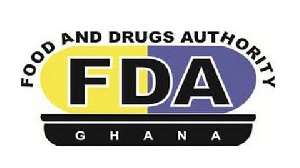As part of efforts to build the capacity its workers, the Food and Drugs Authority (FDA) has organized a four-day food risk profiling training workshop at the Coconut Groove Hotel in Accra for twenty four (24) participants comprising FDA officers from all the regions and the Ghana Health Service (GHS) with the support of WHO.
Risk profiles are a practical tool for risk managers. It helps regulatory body like the FDA to make regulatory decisions.
In a welcome address read on behalf of the CEO of the FDA, the Acting Deputy Chief Executive Officer responsible for the Food Inspectorate Division, Mrs. Isabella Mansa Agra, said, the recent happenings worldwide with regard to increase in foodborne illness arising from enteric organisms, suggests the need for more effective controls using internationally agreed risk management methods which will go a long way to protect public health and safety.
Mrs. Agra stressed that, “Globally, recognition has been given for the need to continually strengthen food control systems based on the risk analysis approach.
She added that central to this approach is the identification and prioritization of food safety risks to the population of a given country and the adoption of cost-effective control measures to minimize risks to consumer health, consumer welfare and also food trade and market access.”
She informed the participants aware that, the reason for the training is to equip them with knowledge on a systematic, transparent and evidence-based approach to identify, classify and priorities the risks, to be able to mitigate them. This training will therefore add on to the capacity building to guide the implementation of a comprehensive and strategic risk assessment to inform preparedness and response plan for Ghana.
The Head of Programmes of WHO Ghana, Mrs. Akosua Takyiwa Oduro Kwakye, in her speech said, the WHO estimates that almost one (1) in ten (10) people in the world fall ill after eating contaminated food and four hundred and twenty thousand (420,000) die every year resulting in the loss of thirty-three million (33,000,000) healthy life years.
She further explained that children under five (5) years carry 40% of the foodborne diseases, with one hundred and twenty five thousand (125,000) deaths every year with the African Region being the highest with more than ninety-one million (91,000,000) people falling ill from consuming contaminated food and one hundred and thirty-seven thousand (137,000) dying every year.
She reminded participants of how the new emerging threats to food safety are affecting the changes in food production, distribution, consumption and the environment.
Mrs Kwakye added that the new and emerging pathogens all pose challenges to national food safety systems and therefore, there is a need to adapt risk based-approach to meet these changing needs for better protection of public health.
Dr. Sylvain Dabade, a lecturer and a researcher from the University of Abomey Calavi in Benin at the Department of Laboratory of Food Science who was the resource person took participants through the steps of risk analysis, risk assessment and risk management.
At the end of the workshop, participants were examined and certificates of participation were awarded to each participant.
Business News of Friday, 6 September 2019
Source: laudbusiness.com













